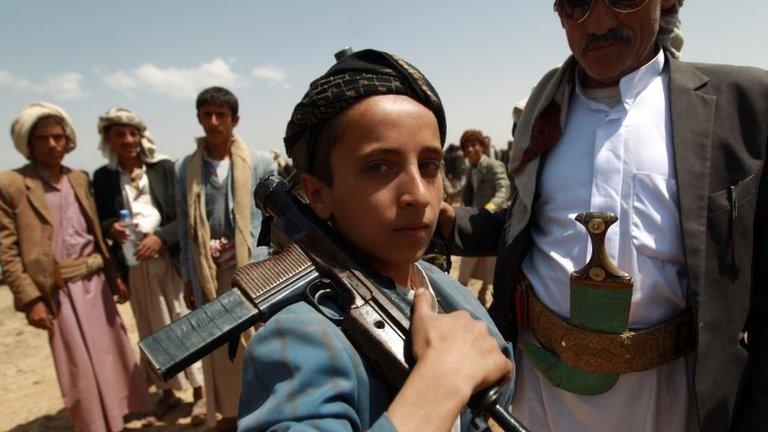Yemen war: Women facing daily struggle to survive
- Published
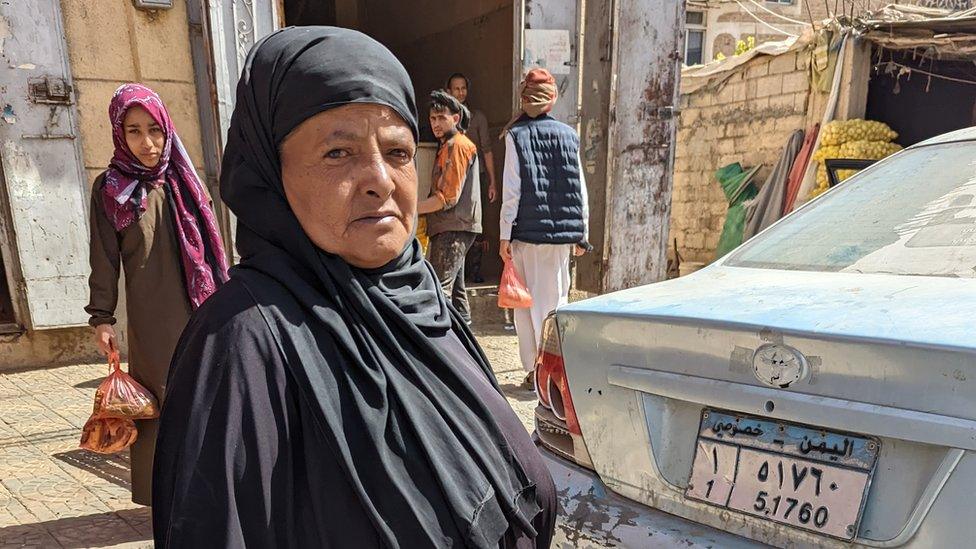
The UN estimates women like Umm Adel are the main breadwinners for one in three families displaced by the fighting
Umm Adel closes her fingers around the rough stone in her hand and gets ready to defend herself. There are wild dogs in the dark street that she's walking down. They're starving and many have rabies.
"Every step I take, my heart is shaking because I'm afraid of the dogs attacking me," she explains. "There are no lights and all the houses are closed, so nobody would help me. I try to walk slowly and quietly so the dogs don't hear me".
She lives in Sanaa, the capital of Yemen.
The United Nations has called the country's humanitarian crisis one of the worst in the world, with two-thirds of the population - around 21.6 million people - needing some form of aid in 2023.
Eight years of fighting between government-aligned forces - backed by a Saudi-led military coalition - and the Iran-aligned Houthi rebels - who control Sanaa and much of the west of the country - have taken a heavy toll on the population, especially women and children.
Female-headed households - like Umm Adel's - face the highest levels of food insecurity, as only a tiny percentage of women work outside their homes in Yemen.
And yet the United Nations Population Fund estimates women are the main breadwinners for one in three families displaced by the fighting.
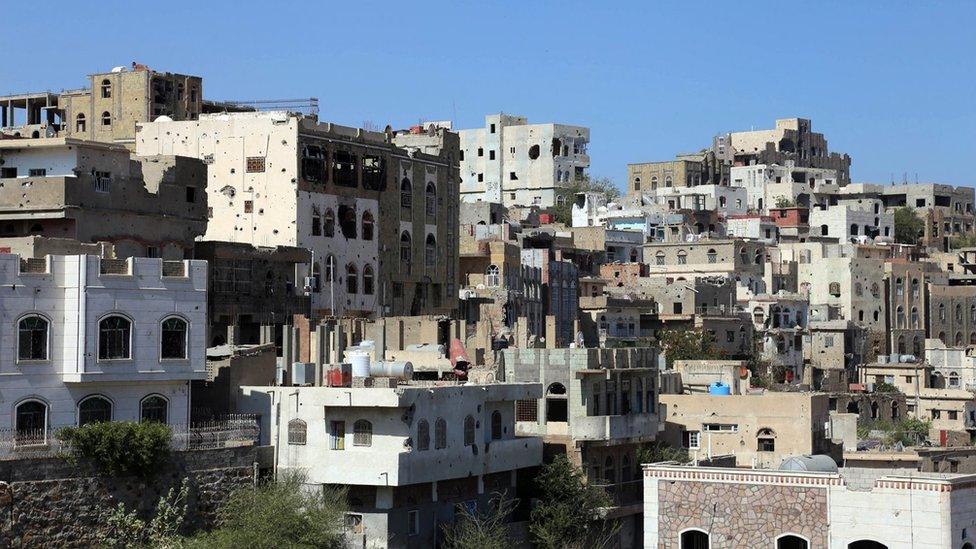
Umm Adel is from the south-western city of Taiz, which has been besieged by the Houthis for most of the war
In her small home, Umm Adel's possessions are piled on the floor in the dirt. Packed into bags, they're ready to be moved at a moment's notice if she and her four children have to leave again.
There's no furniture, so the family sleeps on blankets on the ground. There aren't any pictures on the peeling yellow walls or home comforts. This is a place simply to shelter and to survive in.
Food baskets handed out by charities are in short supply too. Umm Adel has only ever been given one parcel, although she's tried to register herself to receive them many times.
"I have to find wood to make a fire so I can cook rice," she says. "Most of the food we eat is unripe, that's all I can find. My son is unwell, he has spasms, and I can't afford to buy him medicine either."
Although life in Sanaa is tough, Umm Adel still feels safer here than in Taiz, where she's from. The government-controlled city has been besieged by the Houthis throughout the war and cut off from the rest of the country.
"It's dangerous there, people have become savages and they hate each other. I tried to stay there so my kids could be close to their family, but I couldn't continue because nobody helped me."
Yemen's Civil Coalition for Human Rights and Women, a local NGO, says that in 2021 more than 10 million women and girls were in need of assistance.
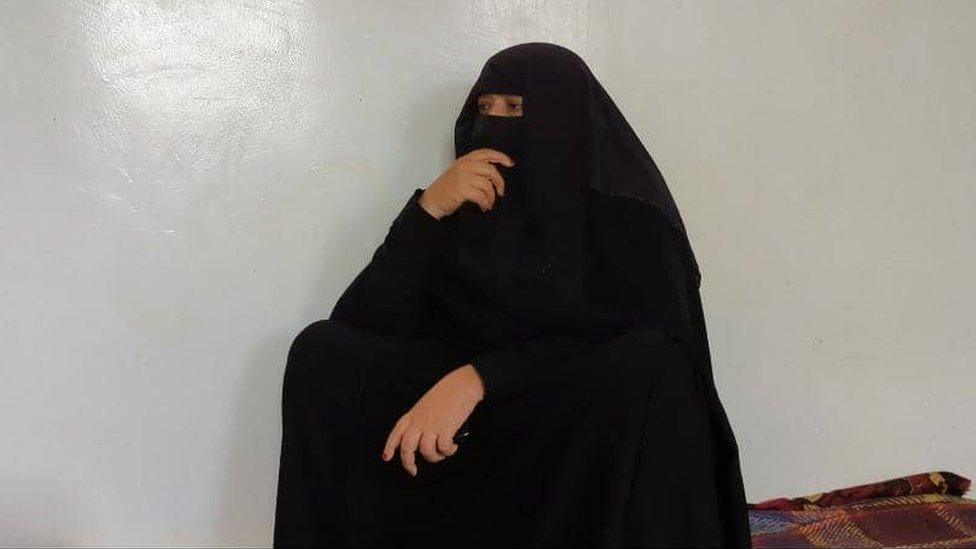
Umm Said is the main breadwinner for her daughters and grandchildren as her sons are fighting with the Houthi rebels
Maeen Sultan al-Obeidi is a lawyer and human rights activist from Taiz. She's in no doubt about who's bearing the brunt of the conflict.
"The people most affected by this war are women," she says.
"Many have been displaced and lost their breadwinners. Parents are forced to marry their daughters at an early age because of the hard financial situation. Many women have lost their sons, husbands and brothers. For those struggling in camps, there is no education or proper healthcare".
She's also worried about women's day-to-day safety.
"At the beginning of the war the water was cut off, so women had to go and fetch it from faraway wells, carrying it for miles over their heads," she adds.
"The gas was cut off, so they had to trek to collect firewood. In the mined areas, many women have lost limbs in explosions when all they were doing was collecting sticks in order to light a fire to feed their children. This is a war that wiped out everything".
At least 109 women have been killed or injured by mines in grazing areas and farms since the start of the conflict in late 2014, according to data collected by the National Commission to Investigate Alleged Violations of Human Rights, a monitoring group established by the government with international support.
Every day, at Mujahid Kamel's small grocery store in Sanaa, he can see how tough the situation has become for his customers.
"People here are so poor, so hungry and depressed," he says. "The cost of transport, oil and taxes makes everything expensive for us to get hold of."
Finding enough to eat is one of the biggest problems Yemenis face. Starvation is a very real threat. The World Food Programme says the emergency response in Yemen was its largest anywhere in the world in 2022, with almost 13 million people provided with either emergency rations or cash to get their own food.
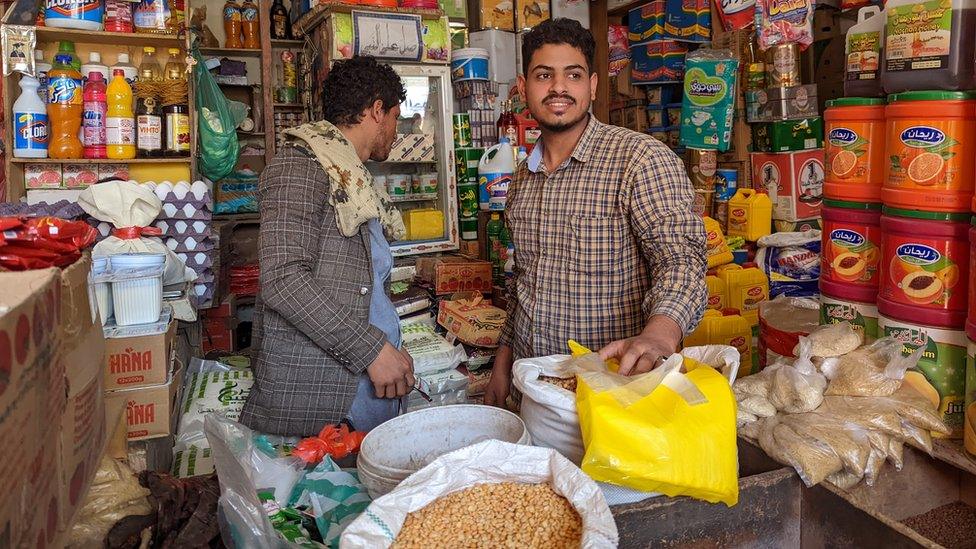
Grocers in Sanaa say the rise in food prices has heavily affected people
Mujahid says people in Yemen buy goods differently now too. "Often they only have enough money to buy food for a single day. And the very basics are all they can afford, things like wheat, flour, oil and ghee".
Umm Said knows this daily struggle well.
She lives with her family in Sanaa and has been there ever since the war started. She's from Razih, an area in the northern province of Saada that is near the border with Saudi Arabia, and remembers the moment she had to collect together her four sons and three daughters and leave.
"Our home was bombed in an air strike, and completely destroyed. All that was left was ashes and dust," she says.
"We were already living in fear every day because so many places in our area had been targeted. We lost our house and my husband's small grocery shop, and for a while before we came to Sanaa we were forced to live in caves in the mountains for shelter.
"I couldn't stop crying, and the children were the same. We had to live in the dark because even the light from a candle would cause an air strike."
Starting again in a new city has left Umm Said desperate for money and struggling to feed her family.
Several of her sons are now fighting for the Houthis in the mountains, which means she has to support her grandchildren too.
She makes a small amount of cash travelling to weddings to sell clothes and make-up tools to the women attending them, but health problems mean she can't do it as often as she needs to, and the income it brings in simply isn't enough.
"Many nights we sleep without dinner," she says. "My neck hurts and I struggle to breathe, but the only thing that will stop me trying to sell my goods is if I die."
Related topics
- Published9 April 2023
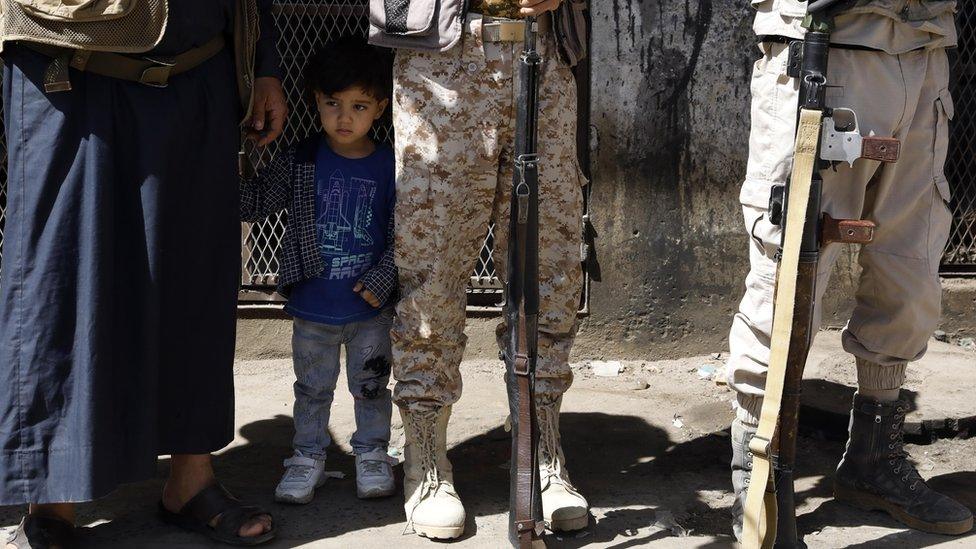
- Published30 January 2022
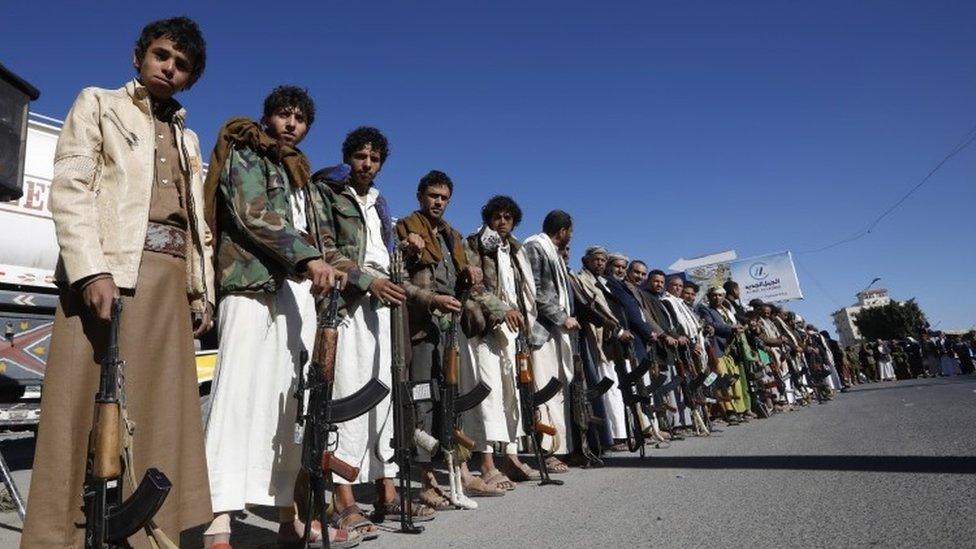
- Published14 April 2023
